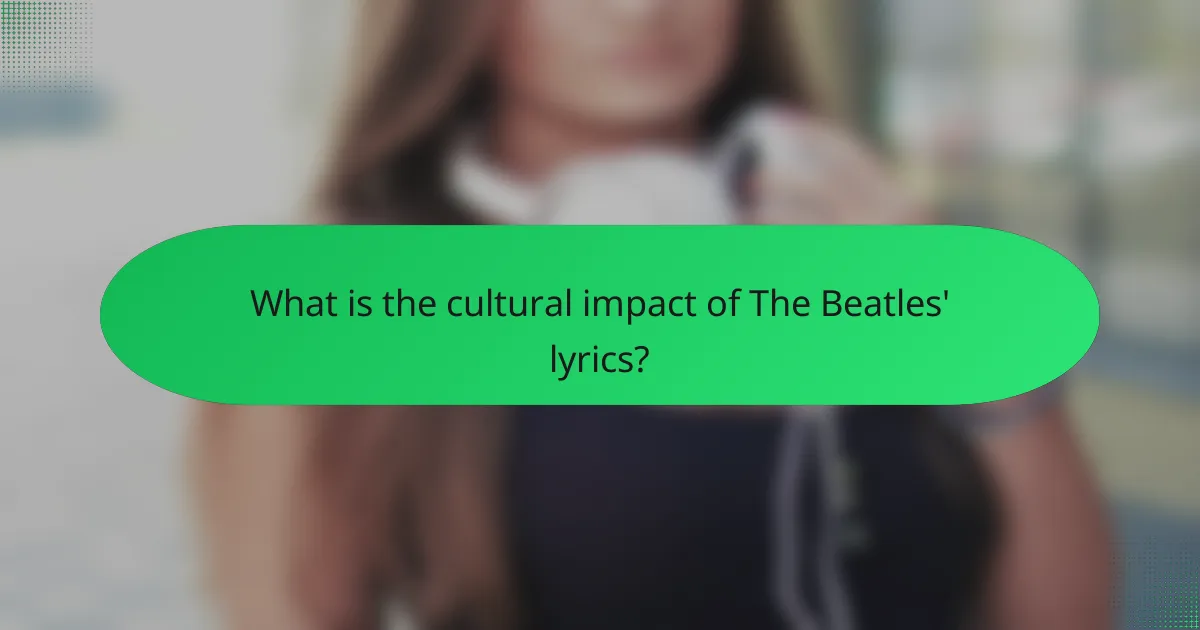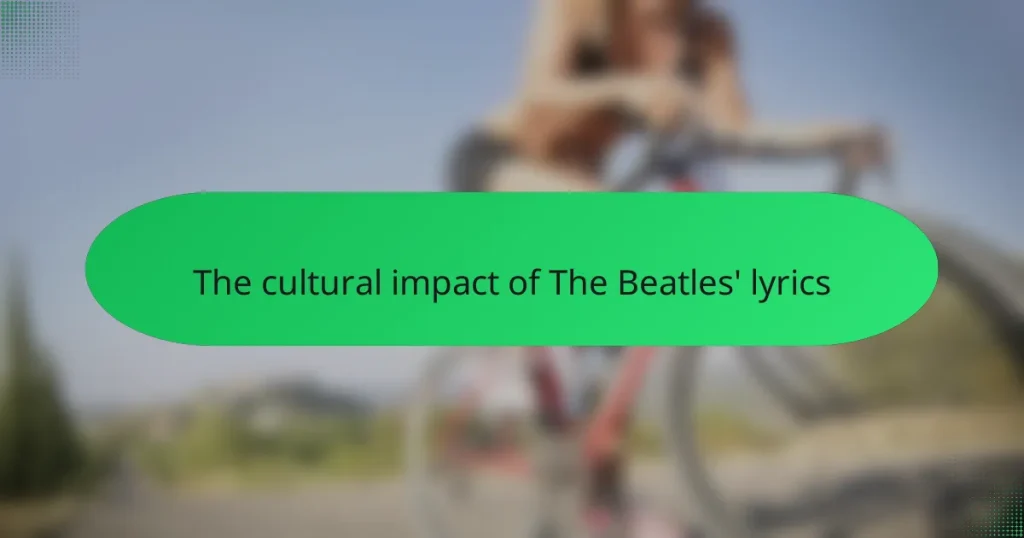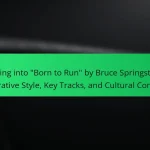The Beatles’ lyrics have had a significant cultural impact, addressing themes such as love, peace, and social change. Their music resonated with the youth of the 1960s, a period marked by cultural upheaval, and often challenged societal norms. Songs like “Revolution” served as anthems for peace movements, while their innovative use of language and storytelling has influenced numerous artists and songwriters. The Beatles elevated popular music to an art form, setting a standard for lyrical creativity and cultural commentary that continues to be relevant today.

What is the cultural impact of The Beatles’ lyrics?
The cultural impact of The Beatles’ lyrics is profound and far-reaching. Their songs addressed themes of love, peace, and social change. This resonated with the youth during the 1960s, a time of significant cultural upheaval. The lyrics often challenged societal norms and inspired movements for civil rights and anti-war protests. For example, “Revolution” became an anthem for peace activists. Additionally, their innovative use of language and storytelling influenced countless artists and songwriters. The Beatles’ lyrics contributed to a shift in popular music, elevating it to an art form. Their work remains a benchmark for lyrical creativity and cultural commentary.
How did The Beatles’ lyrics reflect the social changes of their time?
The Beatles’ lyrics reflected the social changes of their time by addressing themes of love, peace, and social justice. Their songs evolved from simple love ballads to complex narratives that tackled issues like war and civil rights. For example, “Revolution” directly commented on the political climate of the 1960s. The lyrics encouraged listeners to think critically about societal norms and changes. Additionally, songs like “A Day in the Life” showcased the disillusionment of the era. The Beatles captured the spirit of counterculture movements through their music. Their lyrics resonated with a generation seeking change and self-expression. Overall, The Beatles’ work mirrored the shifting attitudes and values of society during the 1960s.
What specific societal issues did The Beatles address in their lyrics?
The Beatles addressed several societal issues in their lyrics, including war, love, and social justice. Their song “Revolution” critiques political violence and promotes peace during the Vietnam War era. “Eleanor Rigby” highlights loneliness and the struggles of individuals in society. “Blackbird” speaks to racial equality and civil rights, inspired by the American civil rights movement. “A Day in the Life” reflects on the disconnection between different social classes. “All You Need Is Love” promotes universal love and unity. Their lyrics often challenged societal norms and encouraged listeners to think critically about contemporary issues.
How did their lyrics influence public perception of these issues?
The Beatles’ lyrics significantly influenced public perception of social and political issues. Their songs addressed topics like love, peace, and civil rights. For instance, “Revolution” encouraged activism during the Vietnam War era. This song prompted discussions on political engagement among youth. Additionally, “Blackbird” highlighted racial equality and inspired the civil rights movement. The lyrics resonated with audiences, shaping their views on equality and justice. Their innovative approach to songwriting brought attention to previously taboo subjects. Consequently, The Beatles became cultural icons, reflecting and shaping societal values during the 1960s. Their influence is evident in the lasting impact on music and social movements.
In what ways did The Beatles’ lyrics contribute to the music industry?
The Beatles’ lyrics significantly contributed to the music industry by introducing innovative themes and complex storytelling. Their songs often explored love, social issues, and personal introspection. This lyrical depth set a new standard for songwriting in popular music. The Beatles’ use of varied musical styles influenced countless artists and genres. Their experimentation with form and structure expanded the boundaries of popular music. Songs like “A Day in the Life” showcased their ability to blend different musical elements. This encouraged other musicians to push creative limits. Their lyrics also resonated with the youth culture of the 1960s, shaping the cultural landscape. The impact of their lyrics can be seen in the evolution of rock music and beyond.
How did their songwriting style change popular music?
The Beatles’ songwriting style revolutionized popular music by introducing complex themes and innovative structures. Their lyrics often explored personal and societal issues, which was uncommon in previous pop music. They incorporated literary techniques, such as imagery and metaphor, enhancing the emotional depth of their songs. The use of unconventional song forms, including non-repetitive structures, broke traditional molds. Their experimentation with various musical genres, like folk, rock, and psychedelia, expanded the boundaries of popular music. The Beatles’ approach influenced countless artists and led to a more introspective and diverse lyrical landscape in the music industry. Their impact is evident in the evolution of songwriting in the decades that followed.
What innovations in lyrical themes did The Beatles introduce?
The Beatles introduced innovations in lyrical themes by exploring personal and introspective subjects. Their songs often delved into complex emotions and relationships. They moved beyond traditional love songs to address themes like existentialism and social commentary. Tracks such as “Eleanor Rigby” highlighted loneliness and isolation. “A Day in the Life” showcased surrealism and narrative storytelling. Their use of imagery and metaphor set a new standard for songwriting. This shift influenced countless artists and genres. The Beatles’ lyrical evolution marked a significant turning point in popular music.
How have The Beatles’ lyrics influenced subsequent generations of musicians?
The Beatles’ lyrics have significantly influenced subsequent generations of musicians by introducing innovative songwriting techniques and themes. Their use of storytelling in songs paved the way for narrative-driven music. The Beatles explored complex emotions and social issues, inspiring artists to address similar topics. Their experimentation with various genres encouraged musical diversity in popular music. Songs like “Lucy in the Sky with Diamonds” showcased surreal imagery, influencing psychedelic rock and beyond. The lyrical depth of tracks such as “Eleanor Rigby” set a precedent for introspective songwriting. Many contemporary artists cite The Beatles as a primary influence in their work. Their ability to blend melody with meaningful lyrics remains a benchmark in music.
Which artists have cited The Beatles as an influence in their work?
Numerous artists have cited The Beatles as an influence in their work. Notable examples include Elton John, who has spoken about their impact on his songwriting. Paul McCartney himself has influenced artists like Michael Jackson and Billy Joel. The band also inspired contemporary musicians such as Oasis and Coldplay. Additionally, artists like David Bowie and Bruce Springsteen have acknowledged The Beatles’ influence on their music. Their innovative approach to songwriting and studio production set a benchmark for countless musicians across genres. The Beatles’ legacy continues to shape the music industry today.
What lyrical techniques have been adopted from The Beatles by modern artists?
Modern artists have adopted several lyrical techniques from The Beatles. These techniques include the use of vivid imagery and storytelling. The Beatles often painted pictures with their words, engaging listeners’ imaginations. They also employed innovative wordplay and puns, which have influenced contemporary songwriting.
Additionally, The Beatles’ incorporation of personal and introspective themes resonates in today’s music. Their ability to blend genres and experiment with form has inspired artists across various styles. The use of unconventional song structures is another technique that has been embraced by modern musicians.
The Beatles’ impact on lyrical complexity is evident in the work of numerous artists today. Their legacy continues to shape the landscape of popular music, showcasing the enduring influence of their lyrical techniques.
What role did The Beatles’ lyrics play in the counterculture movement?
The Beatles’ lyrics significantly influenced the counterculture movement by promoting themes of peace, love, and social change. Their song “All You Need Is Love” became an anthem for the 1960s peace movement. The lyrics challenged traditional norms and encouraged self-expression. Songs like “Revolution” directly addressed political issues and activism. The Beatles’ experimentation with psychedelic imagery in songs like “Lucy in the Sky with Diamonds” reflected the era’s exploration of consciousness. Their music resonated with youth disillusioned by societal expectations. The Beatles’ ability to blend popular music with meaningful messages empowered a generation. Their lyrics helped shape cultural conversations around war, civil rights, and personal freedom.
How did their music resonate with the youth of the 1960s?
The Beatles’ music resonated deeply with the youth of the 1960s by addressing themes of love, peace, and social change. Their lyrics reflected the desires and frustrations of a generation seeking identity and purpose. Songs like “All You Need Is Love” became anthems for the counterculture movement. The Beatles’ innovative sound and relatable messages captured the spirit of the times. Their influence extended beyond music, inspiring fashion and lifestyle choices among young people. The band’s participation in significant cultural events, like the 1969 Woodstock Festival, further solidified their connection with youth culture. Their music provided a voice for young people navigating a rapidly changing world. The Beatles helped shape the cultural landscape of the 1960s, making them icons of that era.
What messages in their lyrics contributed to the ideals of the counterculture?
The Beatles’ lyrics conveyed messages that aligned with the ideals of the counterculture. Their songs promoted peace, love, and social change. For instance, “All You Need Is Love” emphasized universal love and unity. “Revolution” addressed political activism and encouraged listeners to seek change through peaceful means. “Lucy in the Sky with Diamonds” explored psychedelic experiences and expanded consciousness. These themes resonated with the youth of the 1960s, who sought alternatives to mainstream societal norms. The Beatles’ use of imagery and metaphor in their lyrics further inspired listeners to challenge authority and embrace individuality. Their music became anthems for movements advocating for civil rights, anti-war sentiments, and personal freedom.
How do The Beatles’ lyrics continue to resonate today?
The Beatles’ lyrics continue to resonate today due to their universal themes and emotional depth. Their songs explore love, peace, and social change, which remain relevant in contemporary society. For instance, “All You Need Is Love” promotes a message of unity that echoes in modern movements for social justice. Additionally, their innovative songwriting and experimentation with various musical styles have influenced countless artists across genres. The Beatles’ ability to capture the human experience in relatable ways ensures their lyrics remain timeless. Their music is frequently referenced in popular culture, reinforcing its ongoing relevance. Overall, The Beatles’ lyrics connect generations, making their impact enduring and significant.
What themes in their lyrics remain relevant in contemporary society?
Themes in The Beatles’ lyrics that remain relevant include love, peace, and social change. Their songs often explore the complexities of romantic relationships. Love is depicted as a universal experience, resonating with listeners today. The theme of peace is prominent in songs like “Give Peace a Chance.” This message is increasingly relevant amid ongoing global conflicts. Additionally, their lyrics address social issues, reflecting the desire for equality and justice. Songs like “Revolution” inspire activism and encourage societal awareness. The timeless nature of these themes ensures their continued resonance in contemporary society.
How are The Beatles’ lyrics interpreted by modern audiences?
The Beatles’ lyrics are interpreted by modern audiences as reflections of contemporary social issues and personal experiences. Their themes of love, peace, and rebellion resonate with current movements for social justice and emotional expression. For example, songs like “All You Need Is Love” are often viewed as timeless anthems for unity. Furthermore, the lyrics are analyzed for their poetic and innovative qualities. Modern listeners appreciate the complexity of the songwriting, which includes metaphor and surreal imagery. The Beatles’ ability to blend various musical styles also influences how their lyrics are perceived today. Many contemporary artists cite The Beatles as inspirations, showing their lasting relevance. Overall, modern interpretations highlight both the emotional depth and cultural significance of The Beatles’ work.
What are some practical insights into analyzing The Beatles’ lyrics?
Analyzing The Beatles’ lyrics reveals themes of love, social change, and personal introspection. Their use of everyday language makes the songs relatable. The lyrics often reflect the cultural shifts of the 1960s. For example, “Revolution” addresses political activism and social justice. The band also employs vivid imagery and metaphors, enhancing emotional impact. Songs like “Lucy in the Sky with Diamonds” showcase surrealism and imagination. Additionally, the evolution of their lyrical style mirrors their musical experimentation. This progression highlights their artistic growth over the years.
How can one approach the lyrical analysis of The Beatles’ songs?
To approach the lyrical analysis of The Beatles’ songs, one should first examine the themes present in their lyrics. Common themes include love, social change, and introspection. Next, consider the historical context of the songs. The Beatles emerged during the 1960s, a time of significant cultural upheaval. Analyzing the lyrics in relation to this context reveals deeper meanings.
Additionally, one can study the songwriting techniques employed by John Lennon and Paul McCartney. Their use of wordplay and imagery enhances the lyrical depth. Listening to the melodies alongside the lyrics can also provide insight into emotional nuances.
Lastly, comparing their songs to contemporaneous works can highlight their unique contributions to music and culture. This multifaceted approach allows for a comprehensive understanding of The Beatles’ lyrical impact.
What resources are available for deeper exploration of their lyrics?
Books analyzing their lyrics provide in-depth insights. “The Lyrics: 1956 to the Present” by Paul McCartney offers personal perspectives. “Revolution in the Head” by Ian MacDonald examines the songs in historical context. Online platforms like Genius feature annotated lyrics and user interpretations. Academic journals publish articles on the lyrical themes and cultural significance. Documentaries, such as “The Beatles: Eight Days a Week,” explore their music and lyrics. These resources facilitate a comprehensive understanding of The Beatles’ lyrical impact.
The main entity of this article is The Beatles’ lyrics, which have had a significant cultural impact. The article explores how their lyrics addressed themes of love, peace, and social change, resonating with the youth during the 1960s and influencing movements for civil rights and anti-war protests. It examines specific societal issues reflected in their songs, their innovative songwriting techniques, and the lasting influence on subsequent generations of musicians. Additionally, the article discusses how The Beatles’ lyrics contributed to the counterculture movement and continue to resonate in contemporary society.


